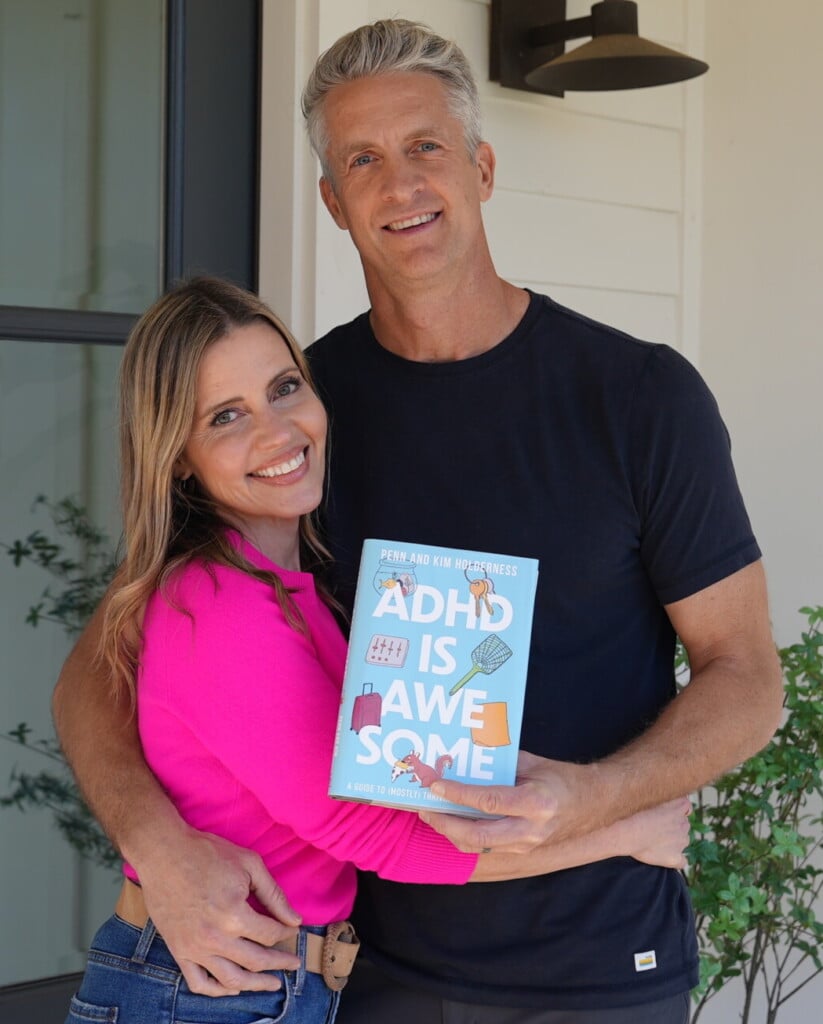The Holderness Family Wants You to Know ADHD Impacts Adults, Too
An Interview with Kim and Penn Holderness

My husband and I discovered Kim and Penn Holderness through social media several years ago. The creative couple behind The Holderness Family brings wholesome laughs to more than 8 million followers with their parodies, skits, and vlogs. As parents of two teens, they tackle family-centered topics like parenting, marriage hacks, and aging. The two also host a podcast together.
Now Kim and Penn are using their platform to discuss a more serious topic: managing ADHD as an adult. “I went undiagnosed until my last year of college,” Penn says. “Before that, I couldn’t explain why certain tasks seemed more difficult for me than for other people. Having a diagnosis brought relief.”
Like Penn, many people aren’t diagnosed with ADHD (Attention Deficit Hyperactivity Disorder) until adulthood. A recent JAMA study found the rate of adults diagnosed with ADHD has more than doubled since 2007.
To shed light on the topic, Kim and Penn have released a new book called ADHD is Awesome (A Guide To Mostly Thriving With ADHD). They wanted to use levity and humor to educate their audience on an often misunderstood and sometimes scary diagnosis. “It bothers me that ADHD has such a negative stigma,” Penn says. “I think in many ways ADHD has been a superpower, allowing me to be a more creative thinker.”
“Many of the reasons I fell in love with Penn—his spontaneity, his energy, his impulsivity—are because of the way his mind works,” Kim adds. “We have our family and our career in part because of ADHD.”
The book is a combination of insights and anecdotes about having a partner with ADHD and parenting with the disorder, along with information from doctors, researchers, and specialists. The book is broken down into easy-to-digest sections to make a weighty topic more manageable.
Kim and Penn hope that using their trademark approach can eliminate some of the stigmas and misinformation surrounding ADHD. “ADHD needs a rebranding,” Penn says. “It’s not all bad, but it can feel like it, especially when you are initially diagnosed. The name itself has two negatives—‘deficit’ and ‘disorder.’ It implies there is something wrong with you, But ADHD is not a serious disease. It is a neuro-developmental condition. Yes, my brain is wired differently, and I think I have a pretty cool brain.”
An upside to ADHD is the ability to take in a lot of details. “The name implies that we have a deficit in our attention span,” Penn says. “But in actuality, it can be a real asset when you focus in on one thing you really care about and block out distractions. When I was on Amazing Race, I was able to hyperfocus on the challenges. Kim and I believe it really helped us stay in the competition.” (The pair went on to win.)
That is not to say that there aren’t difficulties. Kim admits that it can be challenging to be married to a person with ADHD. “There are issues with executive function, calendar fails, and other household chores that can definitely lead to frustration,” she says. “It’s led to kids not being picked up on time, lost wedding rings, and other mishaps.”
In the Holderness house, ADHD is considered an explanation but not an excuse. To illustrate this point, Penn recalls a recent family trip. “I got distracted and forgot my luggage,” he says. “It was annoying for everyone. Just because I have ADHD, that doesn’t make it less annoying for everyone delayed because of my actions. I apologized and tried to fix the mistake so we could move on.”
“Penn never says, ‘I can’t help it—it’s my ADHD’,” Kim adds. “Again, it’s not an excuse or a ‘get out of jail free card.’ But it is an explanation, and I try to remember that he is not doing these things on purpose. I’m not going to say I never lose my cool, but I try not to get angry when these types of things happen.”
Changing the narrative around ADHD became even more important to Kim and Penn after their son, Penn Charles, was diagnosed. “I didn’t want Penn Charles to feel labeled, scared, or ashamed,” Kim says. “There are so many upsides to this disorder. We wanted him to see that, like his dad, he could be successful not in spite of ADHD but because of it.”
Thriving with ADHD means finding ways to lessen symptoms. This could include medication, and therapy, while also embracing the positives. “The ADHD brain you were born with is the brain you will have your whole life,” Penn says, “but you can learn how to manage the symptoms if you understand the disorder.”
RANDI MAZZELLA is a freelance writer specializing in parenting, teen issues, mental health, and wellness. She is a wife and mother of three children. To read more of her work, visit www.randimazella.com.









